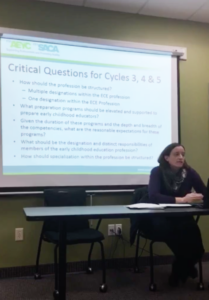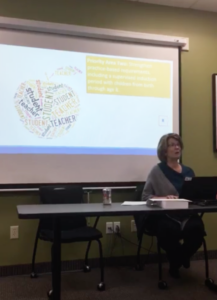By Marie Huey, Public Policy and Advocacy Coordinator
December Policy Hour presenters shared information about state and national initiatives that are working to enhance and improve the early childhood workforce.
Power to the Profession
Sara Benzkofer, Director of Policy and Communications at MnAEYC-MnSACA, joined us to provide updates on Power to the Profession. Power to the Profession is a national collaboration to define the early childhood profession by establishing a unifying framework for career pathways, knowledge and competencies, qualifications, standards, and compensation.
The task force leading the initiative is made up of 15 organizations. Additional stakeholder organizations participate in the process, and the initiative also solicits feedback from people in the field.
The process includes 8 decision cycles that build off each other. So far, two cycles are complete. The first cycle focused on professional identity, defining the work as the Early Childhood Education Profession within the Early Childhood Field. Seven responsibilities of Early Childhood Professionals emerged from the work, including the importance of engaging families, observing and assessing children’s learning, and implementing developmentally appropriate curriculum. Find more in-depth information, including Sara’s PowerPoint presentation, here.
The next three decision cycles will be combined into one and include questions such as: How should the field be structured? What should the preparation programs look like? Surveys should open soon, and NAEYC will collect feedback until April. Find more information about the surveys here.
Minnesota was the highest-responding state in the first two cycles. Sara encouraged continued advocacy and engagement, and suggested Early Childhood Professionals share the information with Gubernatorial candidates.
Debbie Hewitt, Early Learning Services Supervisor at the Minnesota Department of Education, presented information about two initiatives that are also addressing early childhood education workforce issues.
B8 Work Group
The Birth to eight years old (B8) Team used the 2015 Institute of Medicine report Transforming the Workforce for Children Birth Through Age 8: A Unifying Foundation, to inform their work and create a 10 year plan to implement in the state.
The Team now has a draft plan and is seeking feedback on their work.
Debbie introduced a new website during her presentation, which contains all of the information about the effort. You can watch a webinar on the recommendations, read related reports, and complete a survey about Minnesota’s Early Childhood Workforce. Feedback is due by the end of March 2018.
National Governors Association
Minnesota was one of a handful of states that were selected to work on ECE workforce issues as part of the National Governors Association. The advisory group of this initiative decided to focus on compensation. Wages for the field remain very low, and turnover is high.
Goals of the NGA group recommendations were:
- Raise base pay
- Reward for quality (program level)
- Reward for education (individual level)
- Bring more resources into programs so they can pay better
- Provide other resources for individuals that aren’t base pay but increase their financial well-being.
To address these goals, the group looked at a variety of strategies that other states have used and determined which of those would be most useful and feasible for Minnesota. Their recommendations are:
- Tax credits
- Continue and increase T.E.A.C.H. and R.E.E.T.A.I.N.
- Increase access to business education and shared services
- Tie compensation to increased public funding
- Implement a wage ladder, where pay increases as education increases (More research is needed to figure out if this would be a feasible or useful strategy)
- Increase private sector support, potentially including tax credits
- Collaborate with other groups, including the B8 Workforce Team
- Continue to raise awareness about the critical importance of fair and adequate compensation
The group presented their recommendations to the Children’s Cabinet and Governor Dayton. Once the full report is finalized, they will share it with stakeholders.










